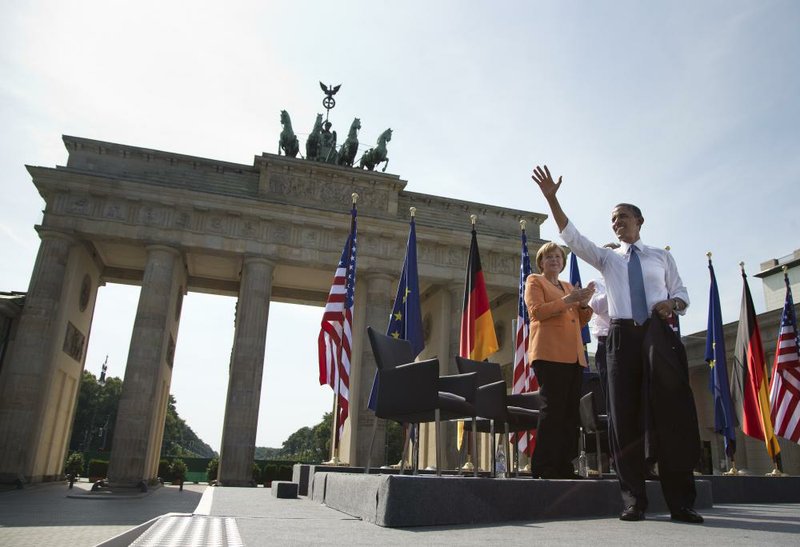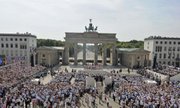BERLIN - President Barack Obama renewed his call Wednesday to reduce U.S. and Russian nuclear stockpiles and to confront climate change, a danger he called “the global threat of our time.”
In a wide-ranging speech in Germany’s capital, Obama said he wanted to reignite the spirit that Berlin displayed when it fought to reunite itself during the Cold War.
“Today’s threats are not as stark as they were half a century ago, but the struggle for freedom and security and human dignity, that struggle goes on,” Obama said at the city’s historic Brandenburg Gate under a bright, hot sun. “And I come here to this city of hope because the test of our time demands the same fighting spirit that defined Berlin a half-century ago.”
The president called for a one-third reduction of U.S. and Russian deployed nuclear weapons, saying it is possible to ensure American security while also limiting nuclear weapons.
Obama’s address was made nearly 50 years after John F. Kennedy’s famous Cold War speech in the once-divided city. In the speech, Kennedy denounced communism and declared “Ich bin ein Berliner,” or “I am a Berliner.”
Obama asked his audience to heed the former president’s message.
“If we lift our eyes as President Kennedy calls us to do, then we’ll recognize that our work is not yet done,” he said. “So we are not only citizens of America or Germany, we are also citizens of the world.”
Obama spoke repeatedly of seeking “peace with justice” around the world by confronting intolerance, poverty, Middle East conflicts and economic inequality in addition to reducing nuclear stockpiles.
The president discussed nuclear nonproliferation with Russian President Vladimir Putin when they met Monday on the sidelines of the Group of Eight summit in Northern Ireland. During Obama’s first term, the U.S. and Russia agreed to limit their deployed weapons to 1,550 as part of the New START pact.
In Moscow on Wednesday, Russian foreign-policy aide Yuri Ushakov said plans for any further arms reduction would have to involve countries beyond Russia and the United States.
“The situation is now far from what it was in the ’60s and ’70s, when only the USA and the Soviet Union discussed arms reduction,” Ushakov said.
Alexei Pushkov, head of the Duma’s foreign affairs committee, told the Interfax news agency that the president’s proposals need “serious revision so that they can be seen by the Russian side as serious and not as propaganda proposals.”
Obama on Wednesday also issued a call to tackle climate change, an issue he has promised to make a priority since his 2008 presidential campaign.
“Peace with justice means refusing to condemn our children to a harsher, less hospitable planet,” he said.
He said the U.S. has expanded renewable energy from clean sources and is doubling automobile fuel efficiency. But he said that without more action by all countries, the world faces what he called a grim alternative of more severe storms, famine, floods, vanishing coastlines and displaced refugees.
“This is the future we must avert,” he said. “This is the global threat of our time.”
Meanwhile, contention over U.S. government surveillance programs followed the president overseas.
German Chancellor Angela Merkel, during a news conference with Obama in Berlin, said the two discussed a U.S. program, called Prism, that monitors the Internet activity of foreigners believed to be located outside the U.S. and plotting terrorist attacks.
“This is not a situation in which we are rifling through the ordinary e-mails of German citizens or American citizens or French citizens or anybody else,” Obama said. “We have struck the appropriate balance” between security and privacy, he said, insisting U.S. surveillance programs have saved lives.
Merkel said that as with other technological developments, “it’s important that we learn to use it with proportion.”
The National Security Agency’s operations have come under scrutiny after former contract worker Edward Snowden exposed the previously secret programs to The Guardian and The Washington Post. U.S. lawmakers and civil-liberties groups have sought more information on the two programs Snowden disclosed, Prism and another that collects phone-call records from millions of U.S. citizens.
Obama and his wife, Michelle, attended an official dinner hosted by Merkel and her husband, Joachim Sauer, at the Schloss Charlottenburg palace to cap their day. Information for this article was contributed by Julie Pace, Frank Jordans and Jim Kuhnhenn of The Associated Press and by Mike Dorning, Hans Nichols, Patrick Donahue, Phil Mattingly and Joe Sobczyk of Bloomberg News.
Front Section, Pages 7 on 06/20/2013


